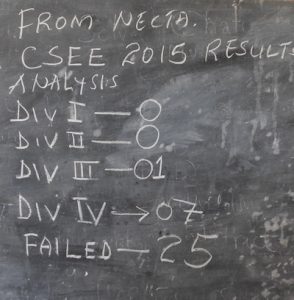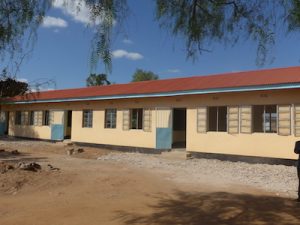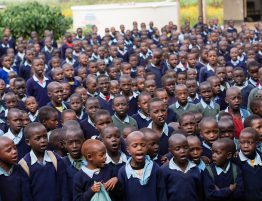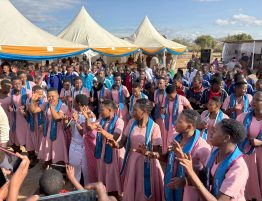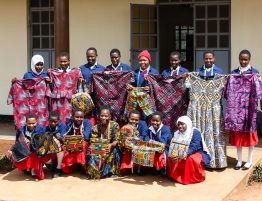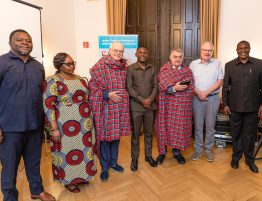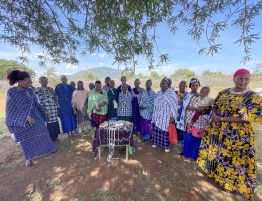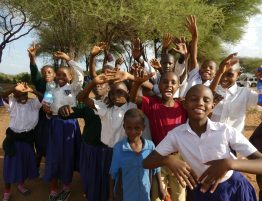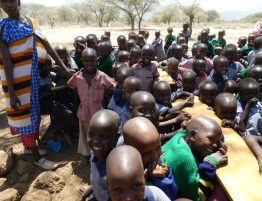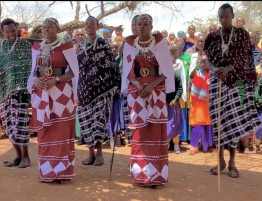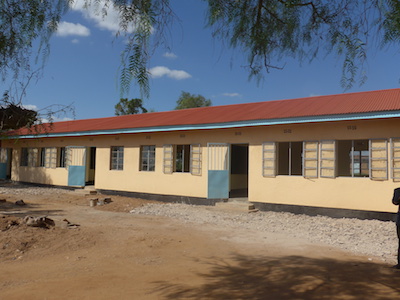
This newsletter has its focus on current developments in the two main pillars of our work in Tanzania: the establishment of a secondary school in Emboreet and the women’s projects of our partner organization ECLAT. In the following newsletters we will inform again about the other projects.
Graduation at the Secondary School
School-leaving examinations took place in the secondary school in Emboreet in November last year (see our last newsletter). In order to have the same standard all over the country these examinations are organized and evaluated on a central level by the Tanzanian government. It took a few months before the results of our students were available but when I visited the school in February this year the results were written on the board in the provisional teacher`s room and thus made apparent for every visitor. Out of 33 pupils 25 had not passed the examinations, seven had passed it with D and only one with C. Without any question this is a bad result. We discussed the reasons thoroughly. The number of teachers has been high for more than a year, after all there is one teacher for 10 pupils – a relation which is unusual in Tanzania. The high number of teachers is a clear sign of the relevance of this school to the Tanzanian government. The teachers are throughout young and inexperienced and as it is mostly the case in the country they are not really well trained for their tasks.
The bad learning conditions in the first two to three years in the school had nonetheless been crucial for the poor performance of the students.
The poor results show how important it is to quickly continue the development of the secondary school. Instead of spending their time with fetching water the students ought to spend more time in classes. Without electricity there is no light available for reading and learning in the evenings (it gets dark at 6 p.m.) When students due to the lack of dormitories have to walk twice a day many miles there is not enough time and energy left for learning. Also teachers who live far away have to see how to get to the school and so the classes often do not take place. The teachers have to live together with their families somewhere in the villages in huts so that they are not available in the school to supervise the students. Like other students all over the world also those in Emboreet prefer playing to learning after the classes have finished. upendo at all events wants to make every effort to facilitate the quick development of the school.
Apart from the poor performance of the students at the end of the fourth year in school there is however also a ray of hope: the results of the intermediary examinations after the second year in school turned out to be good: there were three A, six B, two C, ten D and only two Failed. These students already profited from the improved situation in the school, whereas for their predecessors the further developments and improvements came too late.
Outlook on the Future: A Levels at the Secondary School
In the whole Simanjiro-District whose surface equals 2/3 of the federal state of North-Rhine Westphalia in Germany (13,159.96 sq mi) and where 200.000 people life there is not one school leading to A levels. In fact there are 16 secondary schools (all of which are state run) which only allow passing the O levels.
During my visit in February the school administration of the district and the region asked ECLAT and upendo for a meeting. The government considers the secondary school in Emboreet as the best in the district and decided to designate this school as the only and first school in the district to lead to A levels. The number of students passing O levels having risen over the last years made this step obvious and it will become effective on July 1, 2016.
We have welcomed this decision and assured the government representatives that upendo is willing to continue its involvement in the development of the school. However I also made it clear that the school can only be completed through a mutual effort of upendo, the municipality and the state which runs the school.
We made arrangements concerning the next construction projects of ECLAT on the one side and the government on the other side, and agreed that ECLAT will regularly attend the government`s meetings dealing with the secondary school in Emboreet.
Another positive sign is that the number of students in this year`s entry classes is double the number as before. Instead of just one class on the entry level there will be two classes with 96 students altogether (42 girls and 54 boys).
Economic Activities of Women`s Groups
Visiting Emboreet in February I had the opportunity to meet again with some women`s groups. Besides the educational work the enhancement of women in Maasai society is a central part of ECLAT`s work. These projects are perhaps less spectacular than establishing a school but for the Maasai culture probably of crucial importance. Maasai women have virtually no rights. They are married as teenagers and they then have to fend for their children and themselves They are not granted to own something of their own, they are completely dependent on their husbands who are married with several women. Philomena Kiroya, a Maasai women herself, coordinates the women`s groups. She participates in the meetings where the women discuss their personal situation and problems they face. Over time we want to provide all groups with seed capital which the groups can administer and which will allow the women to earn some money. Several women`s groups proudly showed me in February the cattle which they bought with their seed capital and which had now grown from calves into
impressive bulls. Some women already have been able to sell cattle at a profit and to buy new calves from the proceeds. Some cattle have been “payed back” to ECLAT thus serving as new seed capital for new groups. Some women were able to afford a corrugated tin roof from the proceeds. Considering that Maasai women traditionally do not dispose of any income and that they do not have the right to own property such a “ roof over their head” is normally unaffordable for the women who are responsible for the construction and maintenance of the huts. Therefore their gratitude is all the greater.
Renovating the Primary School in Emboreet
Finally some news in brief: at the beginning of 2016 ECLAT was able to renovate the primary school in Emboreet in only a few months. Thanks to the new school furniture the children no longer have to sit on broken benches in partly crumbled classrooms. We also had the means to improve the sanitary facilities; the old latrines were no longer useable. We thank DER Touristik and FLY & HELP for financing the urgently needed improvements.
Fred Heimbach
Translation to english: Marita Sand

